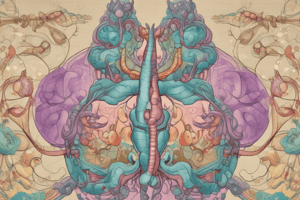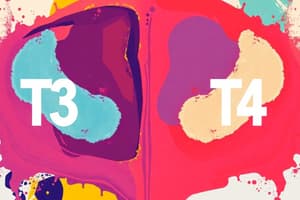Podcast
Questions and Answers
What is the expected normal range for radioactive iodine uptake after 24 hours?
What is the expected normal range for radioactive iodine uptake after 24 hours?
- 15 - 35 %
- 5 - 30 % (correct)
- 10 - 40 %
- 0 - 25 %
Which of the following is NOT a clinical feature of acromegaly?
Which of the following is NOT a clinical feature of acromegaly?
- Deep and husky voice
- Enlarged soft tissues
- Regular menstrual cycles (correct)
- Prognathism
What is the primary function of growth hormone in the body?
What is the primary function of growth hormone in the body?
- Decrease protein synthesis
- Reduce free fatty acids
- Increase blood glucose levels (correct)
- Enhance digestive enzymes
Which condition is primarily caused by an adenoma of the pituitary gland?
Which condition is primarily caused by an adenoma of the pituitary gland?
Which of the following hormones is primarily affected in Cushing syndrome?
Which of the following hormones is primarily affected in Cushing syndrome?
What complication may result from an untreated pituitary tumor?
What complication may result from an untreated pituitary tumor?
Which of the following is a feature of the adrenal medulla's secretion?
Which of the following is a feature of the adrenal medulla's secretion?
Which of the following is a common cause of Cushing syndrome?
Which of the following is a common cause of Cushing syndrome?
What is the primary function of thyroid-stimulating hormone (TSH)?
What is the primary function of thyroid-stimulating hormone (TSH)?
What is thyrotoxicosis primarily associated with?
What is thyrotoxicosis primarily associated with?
Which sign is characterized by the upper eyelid lagging behind the eyeball when looking downward?
Which sign is characterized by the upper eyelid lagging behind the eyeball when looking downward?
Which of the following symptoms is NOT typically associated with hyperthyroidism?
Which of the following symptoms is NOT typically associated with hyperthyroidism?
What commonly happens in the absence of TSH due to negative feedback from T4 and T3?
What commonly happens in the absence of TSH due to negative feedback from T4 and T3?
Which symptom is more likely to be experienced by someone with hypothyroidism?
Which symptom is more likely to be experienced by someone with hypothyroidism?
How is thyroid function initially evaluated?
How is thyroid function initially evaluated?
Which of the following statements regarding hyperthyroidism is accurate?
Which of the following statements regarding hyperthyroidism is accurate?
What symptom is commonly associated with adrenal malignancy due to ectopic ACTH secretion?
What symptom is commonly associated with adrenal malignancy due to ectopic ACTH secretion?
Which of the following is a potential outcome of primary adrenal insufficiency (Addison's Disease)?
Which of the following is a potential outcome of primary adrenal insufficiency (Addison's Disease)?
Which sign is most indicative of Cushing's syndrome?
Which sign is most indicative of Cushing's syndrome?
What is a common effect of hyperparathyroidism due to hypercalcemia?
What is a common effect of hyperparathyroidism due to hypercalcemia?
What is the primary stimulus for parathormone (PTH) secretion?
What is the primary stimulus for parathormone (PTH) secretion?
What symptom is most likely associated with secondary adrenal insufficiency?
What symptom is most likely associated with secondary adrenal insufficiency?
Which of the following is NOT a sign associated with adrenal malignancy?
Which of the following is NOT a sign associated with adrenal malignancy?
Which gland is responsible for secreting parathormone (PTH)?
Which gland is responsible for secreting parathormone (PTH)?
Which of the following is a primary secretory product of the thyroid gland?
Which of the following is a primary secretory product of the thyroid gland?
What percentage of circulating T3 is derived from the deiodination of T4 in peripheral tissues?
What percentage of circulating T3 is derived from the deiodination of T4 in peripheral tissues?
Which hormone primarily influences cell differentiation, growth, and metabolism?
Which hormone primarily influences cell differentiation, growth, and metabolism?
What is the recommended minimum daily intake of iodine for adults?
What is the recommended minimum daily intake of iodine for adults?
What role does T3 play in skeletal maturation?
What role does T3 play in skeletal maturation?
Which plasma carrier protein binds the highest percentage of circulating T4?
Which plasma carrier protein binds the highest percentage of circulating T4?
What is the effect of thyroid hormone on basal metabolic rate?
What is the effect of thyroid hormone on basal metabolic rate?
Which of the following hormones is secreted by parafollicular cells in the thyroid gland?
Which of the following hormones is secreted by parafollicular cells in the thyroid gland?
What role does free hormone play in the body?
What role does free hormone play in the body?
Which of the following effects is NOT associated with thyroid hormones?
Which of the following effects is NOT associated with thyroid hormones?
What is a consequence of calcium deposition in the renal tubules?
What is a consequence of calcium deposition in the renal tubules?
Which of the following is a clinical manifestation of hypoparathyroidism?
Which of the following is a clinical manifestation of hypoparathyroidism?
Which lab findings are indicative of hypoparathyroidism?
Which lab findings are indicative of hypoparathyroidism?
What is a common treatment for hypercalcemia?
What is a common treatment for hypercalcemia?
Which symptom is associated with nephrocalcinosis?
Which symptom is associated with nephrocalcinosis?
What is a common symptom of hypercalcemia?
What is a common symptom of hypercalcemia?
What indicates a failure of PTH secretion?
What indicates a failure of PTH secretion?
Which of the following can lead to impaired mentation and memory loss?
Which of the following can lead to impaired mentation and memory loss?
Flashcards are hidden until you start studying
Study Notes
Thyroid Gland and Thyroid Hormones
- The thyroid gland secretes thyroid hormones and calcitonin, crucial for calcium homeostasis.
- The follicles are the functional units of the thyroid gland.
- The thyroid produces T4 (thyroxine) and T3 (triiodothyronine), which are essential for cell differentiation, growth, and metabolism.
- Iodine is a crucial element for thyroid hormone synthesis and is obtained through various foods, supplements, and iodized salt.
- T4 is the primary product of the thyroid gland, while T3 is mostly derived from T4 deiodination in peripheral tissues.
- Carrier proteins (TBG, TTR, albumin) bind over 99% of circulating T4 and T3, with only the unbound (free) hormone having metabolic activity.
Thyroid Hormone Action
- Thyroid hormone plays a vital role in various bodily functions, including:
- fetal brain and skeletal maturation
- increasing basal metabolic rate
- influencing cardiovascular function (inotropic and chronotropic effects)
- enhancing sensitivity to catecholamines
- stimulating gut motility
- increasing bone turnover
- affecting blood glucose and cholesterol levels
Control of Thyroid Function
- The hypothalamic-pituitary-thyroid axis regulates thyroid hormone production and secretion.
- The hypothalamus secretes TRH (thyroid-releasing hormone), which stimulates the anterior pituitary to release TSH (thyroid-stimulating hormone).
- TSH promotes thyroid hormone synthesis and secretion.
- Negative feedback by T4 and T3 regulates the axis, ensuring proper thyroid hormone levels.
Thyroid Disorders
- Hypothyroidism occurs when the thyroid gland is underactive, leading to reduced thyroid hormone production.
- Symptoms include:
- dry hair
- puffy face
- slow heart beat
- weight gain
- constipation
- brittle nails
- cold intolerance
- depression
- fatigue
- memory loss
- heavy menstrual periods
- muscle aches
- Symptoms include:
- Hyperthyroidism occurs when the thyroid gland is overactive, leading to increased thyroid hormone production.
- Symptoms include:
- hair loss
- bulging eyes
- sweating
- rapid heart beat
- weight loss
- regular gas
- soft nails
- sleep difficulties
- heat intolerance
- infertility
- irritability
- muscle weakness
- nervousness
- scant menstrual periods
- Symptoms include:
Evaluation of Thyroid Function
- Laboratory tests are essential for evaluating thyroid function:
- total T4, T3, free T4, and free T3 measurements
- radioactive iodine uptake (RAIU) to assess thyroid gland activity
- serum TSH to assess pituitary function
- Imaging studies may also be helpful:
- thyroid ultrasound to visualize the gland
- fine needle aspiration biopsy for cytological diagnosis
Pituitary Gland
- The pituitary gland secretes various hormones, including growth hormone (GH).
- GH plays a crucial role in growth, metabolism, and cellular processes.
- Acromegaly is a condition characterized by excessive GH secretion, resulting in abnormal growth and enlarged features.
- Clinical manifestations include:
- coarse facial features
- enlarged hands and feet
- thickened skin with increased hair growth
- deep and husky voice
- joint pain
- cardiovascular complications (cardiomegaly, hypertension)
- compression of nerves causing sensory and motor disturbances
- headaches
- Clinical manifestations include:
Adrenal Gland Disorders
- The adrenal gland produces cortisol, mineralocorticoids, and androgens from the cortex, and adrenaline from the medulla.
- Adrenocortical hormones are essential for:
- nutrient metabolism
- circulatory system function
- muscle function
- blood cell production
- skeletal system maintenance
- brain and nerve function
- immune system function
Cushing's Syndrome
- Cushing's syndrome is characterized by excessive cortisol levels in the blood.
- Etiologies include:
- iatrogenic (steroid therapy)
- pituitary adenoma (ACTH-secreting)
- adrenal tumors (cortisol-secreting)
- ectopic ACTH production (e.g., small cell lung cancer)
Cushing's Syndrome Symptoms
- Symptoms include:
- mood changes (depression, euphoria)
- easy bruising
- weakness
- weight gain
- amenorrhea
- back pain
- Signs include:
- truncal obesity
- moon face
- buffalo hump
- striae rubra
- hypertension
- osteoporosis
- thin, fragile skin
- diabetes
- hirsutism (abnormal hair growth)
Hypofunction of the Adrenal Gland
- Adrenal insufficiency (Addison's disease) is characterized by an insufficient production of adrenal hormones.
- Etiologies include:
- secondary (pituitary insufficiency)
- primary (adrenal gland failure) due to:
- destruction (tuberculosis, fungal infections, amyloidosis, hemochromatosis)
- tumor
- autoimmune process
Adrenal Insufficiency Symptoms
- Symptoms include:
- weakness, fatigue, dizziness
- nausea, vomiting, weight loss
- diarrhea, dehydration
- salt craving
- abdominal pain
Adrenal Insufficiency Signs
- Signs include:
- hyperpigmentation: darkening of skin, buccal mucosa
- hypotension
- reduced hair growth
- dehydration signs
Parathyroid Gland
- The parathyroid glands secrete parathyroid hormone (PTH), which regulates calcium levels in the blood.
- Hypocalcemia stimulates PTH secretion.
- Hyperparathyroidism occurs when the parathyroid glands are overactive, leading to excessive PTH production and hypercalcemia.
Hyperparathyroidism Symptoms
- Many patients are asymptomatic.
- Symptoms may be non-specific, such as weakness, fatigue, and easy fatigueability.
- Symptoms due to hypercalcemia:
- anorexia, nausea, vomiting, dyspepsia, constipation
- increased risk of peptic ulcer disease and pancreatitis
- interstitial nephritis leading to polyuria, polydipsia, nocturia
- renal stones (calcium oxalate and phosphate stones) leading to renal colic and UTIs
- nephrocalcinosis (kidney calcification)
- impaired mentation, memory loss, emotional lability, depression
- weakness, arthralgia
- severe pruritus (calcification of the skin)
- bone resorption leading to cysts, brown tumors, subperiosteal erosion
Hyperparathyroidism Diagnosis
- Laboratory tests:
- hypercalcemia
- hypophosphatemia
- increased alkaline phosphatase
- increased PTH levels
- urinalysis and kidney X-ray
- bone density test
Hyperparathyroidism Treatment
- Medical treatment to manage hypercalcemia
- Surgical removal of overactive parathyroid glands
Hypoparathyroidism
- Hypoparathyroidism occurs when there is a failure of PTH secretion, leading to hypocalcemia.
- Causes:
- surgical (thyroidectomy, neck exploration, removal of neck cancer)
- transient (after removal of a parathyroid adenoma)
- idiopathic (autoimmune)
- prolonged hypomagnesemia
Hypoparathyroidism Clinical Picture
- Asymptomatic or manifestations of hypocalcemia:
- neuromuscular activity: numbness, tingling around the mouth and lips, paresthesias in the hands and feet
- bronchospasm, laryngeal spasm (stridor)
- carpopedal spasm
Hypoparathyroidism Diagnosis
- Laboratory tests:
- decreased serum calcium
- increased phosphate (in the absence of renal failure)
- decreased PTH levels
References
- Step-Up to Medicine, 5th edition
- Davidson’s Principles & Practice of Medicine, 23rd edition
Studying That Suits You
Use AI to generate personalized quizzes and flashcards to suit your learning preferences.




